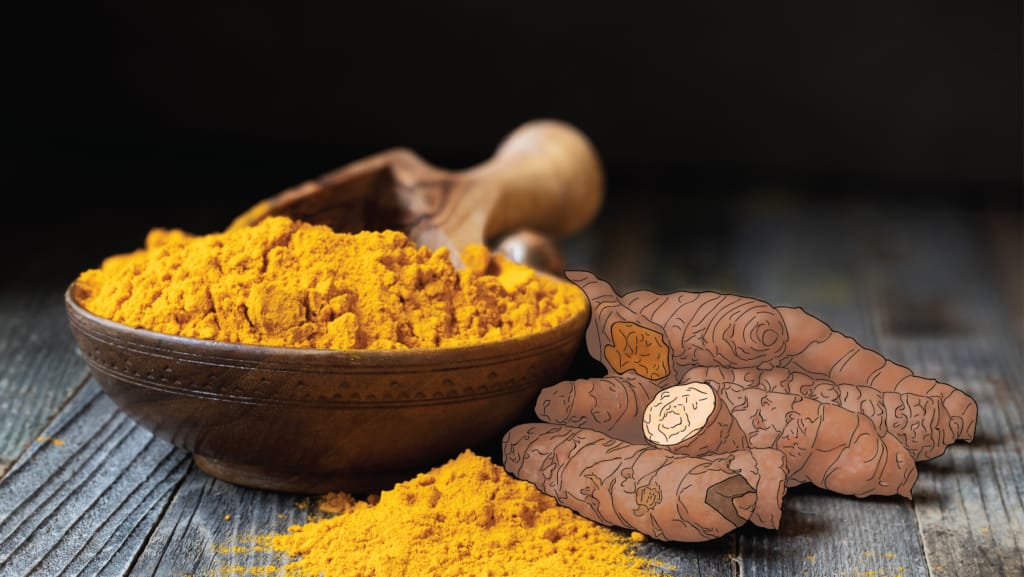
Although turmeric has been a widely-used culinary spice for centuries, in the past few years it’s medicinal uses have been highlighted and celebrated. As a result, turmeric has become a mainstream “superfood” and multipurpose healer. It can now be found in a broad range of supplements, healthy recipes, and skincare products.
What many modern enthusiasts don’t know is that turmeric has been one of Ayurveda’s staple healing herbs for thousands of years. As a cheap and accessible kitchen spice with a number of beneficial health properties, turmeric is a welcome addition to anyone’s diet.
What is Turmeric?
Turmeric (curcuma) is a bright yellow or orange Indian cooking spice that is made from the root of the turmeric plant. It has an earthy, warm and astringent taste and is one of the primary spices used in curries and many other South-Asian dishes. The bright and staining yellow colour of turmeric is also used as a dye to colour culinary dishes, cheeses, and even other materials, such as cotton. Turmeric is also a popular medicine, used to treat conditions involving pain and inflammation.
Turmeric contains an active chemical called Curcumin which is a powerful anti-inflammatory. Nowadays, many companies produce “curcumin” products to treat inflammation. These products are created by extracting the active ingredient from the turmeric root with the intention of creating a more potent form of the medicinal element within the root.
However, the problem with Curcumin products is that, by splitting up the root, the curcumin actually becomes very difficult for the body to process. As is the case with most herbs and plants, it is always preferable to use turmeric in its whole form. Everything in nature is made up of a very distinct elemental balance, and once we start to mess with the make-up of a plant, we alter its qualities. Therefore my advice would be to always try to take herbs in their most complete form.
Health Benefits
- A powerful anti-inflammatory
- Ignites the digestive fire
- Promotes healthy intestinal flora and supports the gut
- Detoxifies the GI tract
- Relieves symptoms of Irritable Bowel Syndrome (IBS)
- Helps to regulate blood pressure and healthy blood glucose levels
- Purifies the blood
- Aids the proper functioning of the pancreas and the heart
- Provides musculoskeletal support — aiding comfortable joint mobility and relieves stiff muscles
- Boosts the immune system
- Supports healthy hair, skin and nails, creating a glowing complexion
- Soothes skin irritation
- Reduces kapha dosha
- Relieves allergies, decreasing mucus production and preventing blockage of the sinuses
- Clears the channels of the physical and subtle bodies
- Some studies have even shown the active Curcumin chemical in turmeric to be a natural antidepressant
When to Take Turmeric
I would recommend everyone to incorporate turmeric into their cooking. Not only will it contribute to the flavour or soups, stews and curries, but it will aid the digestive process, particularly when cooking grains or legumes (such as lentils or chickpeas) that can be a little more difficult to process.
If you are experiencing symptoms of inflammation, skin irritation, or sluggish digestion, you may wish to take a larger, medicinal dosage. Turmeric is also very supportive for detoxes and cleanses, or for seasonal use if you suffer from seasonal allergies.
How to Use It
¼ to ½ teaspoon of good quality turmeric powder can be stirred into warm water, with a small pinch of freshly ground black pepper,* and drunk once or twice daily. If you are primarily taking turmeric to aid digestion, I recommend drinking this on an empty stomach, 20 — 30 minutes before a meal.
Alternatively you can make golden milk by mixing turmeric powder with warm milk and other heating spices, such as ginger, cinnamon and some honey for sweetness. This is a nice tonic to prepare no less than an hour before bed to promote deep sleep. If you have a very kapha constitution, have a lot of mucus, or are currently detoxing, use a nut milk or other non-dairy milk alternative.
* Black pepper helps to activate the curcumin in turmeric and makes the medicine more accessible to the body.
Alternatively, turmeric can be found in tablets or capsules to be taken once or twice daily, before meals. This is a good option for those who aren’t so keen on the flavour of the herb.
Turmeric can also be found as a tincture or liquid extract to be mixed into water two or three times throughout the day.
Contraindications
As a culinary herb, turmeric is suitable for almost everyone. However, once the dosage is upped to a medicinal level there are some contraindications to be aware of.
If you are pregnant, nursing, or currently taking any other prescribed medication, it is best to check with your health practitioner prior to taking turmeric as a supplement. If you have any gallbladder-related issues, such as a bile duct obstruction or gallstones, large quantities of turmeric are best avoided. Similarly, turmeric can be known to lower blood sugar levels, so those with diabetes should be cautious if considering a turmeric supplement. Turmeric can also slow blood clotting, therefore should be avoided before undergoing any type of surgery.